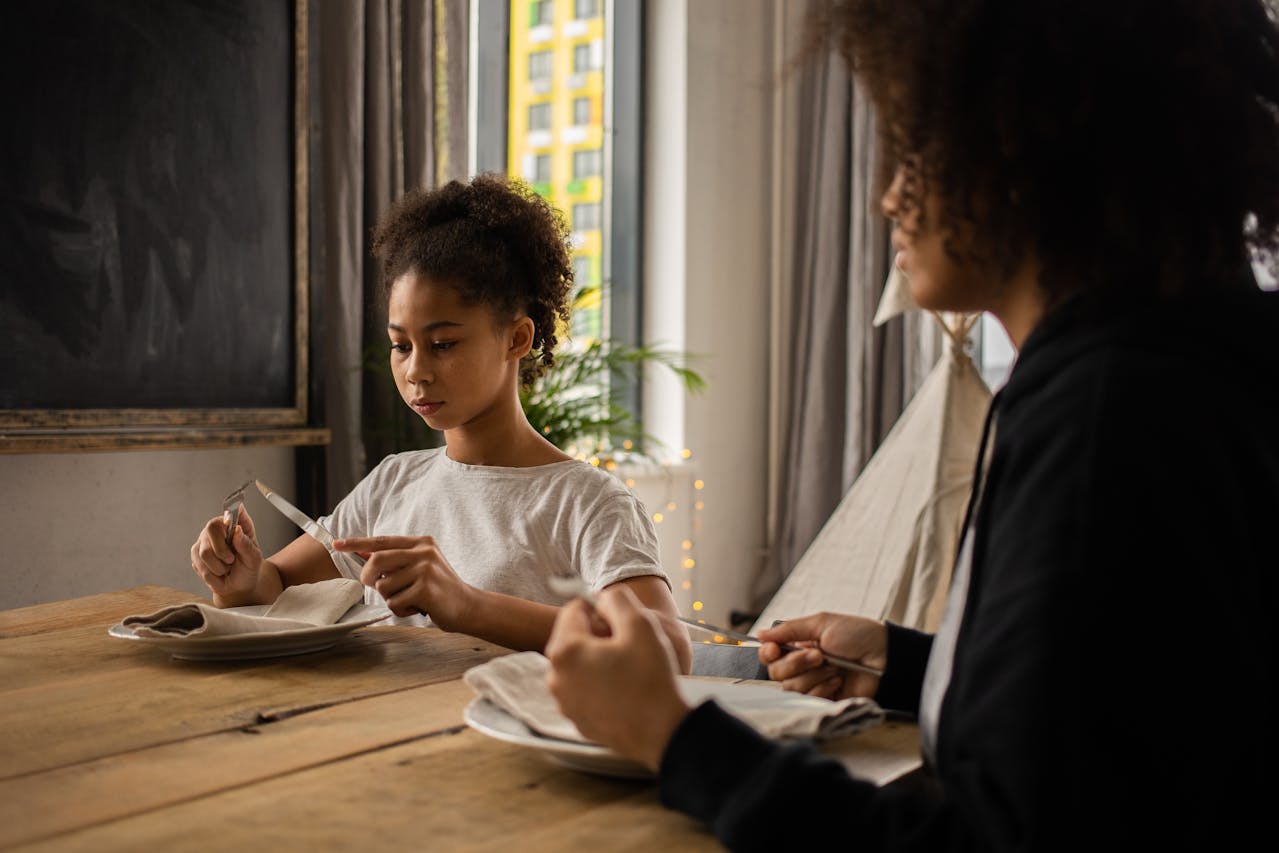Features
‘Fúnmilọ́lá Sanya: What’s The Big Deal About Etiquette?

Watching my sister laugh is always an absolute delight. If LOL was a person, it would undoubtedly be her. Her laughter is not subtle, shy or reserved. It is obvious, loud, and contagiously boisterous. The kind of laughter that echoes through the room, with creases at the eyelids, and a wide-open mouth showcasing all of her 32. You just know it is so genuine from the innermost parts of her belly. Every time I hear her laugh, it excites me and fills me with a familiar comforting warmth. Now that she’s far away on another continent, her laugh is one thing I look forward to over FaceTime and WhatsApp video calls.
So imagine my utter shock when one day I stumbled on an etiquette post on social media scolding women for laughing out loud and giving instructions on the ‘proper’ way to laugh. “Your laugh as a lady should be low, soft, and nicely modulated,” the etiquette coach said. “If your laugh is getting too wide, gently raise your hand to cover your mouth. Take note not to expose your teeth when laughing. It’s unladylike and unacceptable.”
Now, my head is buzzing with so many thoughts and questions. What’s the acceptable decibel level for a laugh to be considered ladylike? How could there even be such a thing as etiquette regarding laughter?
For something as natural as a hearty laugh that expresses joy – a unique expression of individuality and happiness that lights up people’s faces and makes them look brighter – it is quite strange why some people are told to hide it. The idea of being told to cover their mouth when laughing, to be subtle about it, and not to be seen in public with an open-mouthed laugh is so puzzling. And ridiculous, if I must add.
But that is not the only ridiculous etiquette I have seen on the streets of social media. There’s etiquette on how to eat, too, particularly when it comes to local foods like swallows. You’re told to use cutlery: the knife to cut your Eba or Fufu into small bits, the fork to pick the bits and touch the soup delicately. But if you perhaps prefer to use your hands, you’re restricted to only using your thumb and index finger. I look at the scooped Eba, the size fit for a toddler who is just learning to eat solids and the little soup barely touching the morsel. I can’t help but imagine how dry it will feel in the throat.
When observing the wide range of etiquette found on social media, which includes instances of Nigerians themselves making fun of the way Nigerians speak English, as well as guides on how to eat Eba, it makes one wonder if there are remnants of colonialism inherent in these practices.
Now this is not to say that the practice of etiquette is bad. Etiquette plays a vital role in society by teaching us to be considerate of our conduct and mindful of the feelings of others. It is etiquette that tells you not to play music loudly on the bus and subject other passengers to noise pollution. Not to eat boiled eggs when travelling on a train, sneeze without covering your mouth, or chew gum loudly and popping sounds. It tells you not to pee in inappropriate places (side-eye to you people who pee in every nook and cranny of the streets in Lagos). Our parents taught us to chew with our mouths closed and not to talk when eating. That’s etiquette right there. We were taught basic manners like excusing ourselves when visitors came around, and we knew better not to interject when elders were talking. That was how many of us were taught to mind our business. These manners, a silent form of etiquette, were often conveyed with knowing, piercing looks or a subtle clearing of the throat.
But then, where does etiquette cross the line, becoming something extreme that utterly curtails people from being their natural selves? Something that reeks of imperialism and a poor understanding of culture. One aspect etiquette coaches often miss is the consideration of our unique cultural practices. We have our way of doing things. When eating foods like Eba or Pounded Yam, it is expected to eat with our hands; to roll the swallow in between our fingers and use it to scoop a generous quantity of soup. It is also absolutely normal to lick the tips of your soup-stained fingers. Unless we consider our way of doing things barbaric, which then raises questions about our thought processes and the need to liberate ourselves from the shackles of… colonialism? If we find it acceptable that some people can eat their food with chopsticks, slurp, smack and talk with their mouth full while eating, perhaps it’s time for some introspection to confirm that we are not being imperialistic and that we genuinely understand and appreciate diverse cultures.
“It’s pronounced swollow, not swallow.”
Another thing I’ve noticed is how etiquette and diction coaches make you speak English in an overly formal and foreign manner. It comes across as rigid, stiff and uptight. It’s like they’re reeling out words without emotions, and with faces set in a perpetually stoic mode.
We do not speak stiffy. That’s not us. We speak with excitement, chipping in a few metaphors and similies in between to express ourselves. Our speech is lively and full of character. So when etiquette and diction people say we should speak softly and with excessive finesse, it can be unsettling as this is not who we are. Have you listened to an average Nigerian talk? The one on the phone? The one on the street? Well, at least, I know how I talk!
As much as etiquette is good, I find having to conform to the habit of covering my mouths when laughing or eating to be seen as elegant and graceful, problematic. And you should too, don’t you think? Because when next you cringe when someone laughs out loud, or you have to cover your mouth with your hand while eating, I’d be there to ask you why.




















